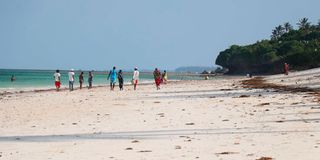Title deeds to no land: Seven buyers lose Diani prime beach plot to firm

Beach operators wait for clients along the Diani Reef Beach front on May 26, 2023.
What you need to know:
- As a result, these seven individuals now possess ownership documents but no actual land, following two court decisions that ruled against them.
- They also requested the court to stop the enforcement of its previous decision, which rejected their appeal regarding the land's ownership.
Seven individuals have lost a legal battle for ownership of a 22-acre beach plot in Diani, Kwale County, amid revelation the state had issued multiple title deeds for the same property.
The dispute involving Said Mabavu, Anna Dereva, Abdalla Hema, Fatuma Nchizumo, Omar Mashaka, Mahfudh Mohamed, and Rama Matano on one side, and Bahati Properties Ltd on the other, has brought to light the allocation of land that was not available for that purpose.
As a result, these seven individuals now possess ownership documents but no actual land, following two court decisions that ruled against them.
Dashed their hopes
The Court of Appeal has further dashed their hopes of reclaiming ownership of the prime plot after blocking their attempt to move to the Supreme Court.
Three appellate Judges Agnes Murgo, Dr Kibaya Laibuta, and George Odunga ruled that their court had already ruled on the dispute and is prevented from reopening the case without statutory authority.
“The prayers for a stay of execution of this court’s judgment pending hearing of the intended appeal to the Supreme Court are incapable of being granted since it is functus officio and lacks jurisdiction to grant such orders,” said the judges
The three judges stated that the seven individuals did not give a convincing reason that the intended appeal involved matters of general public importance to warrant certification to the Supreme Court.
The judges argued that the allocation of alienable and unalienable land, along with the powers of the President of Kenya and the Commissioner of Lands to allot land, are not new issues for determination by the apex court.
Furthermore, the judges noted that the seven individuals did not specify the elements of law that remained unsettled and required consideration by the Supreme Court, nor how the conclusions would impact third parties or other litigants.
“If anything, it is clear to us that the applicants merely seek to dispute the decision of this court on the basis that they, and not the respondent, are entitled to ownership of the suit property. This, in our view, cannot amount to a matter that transcends the public interest, particularly since they ultimately seek to benefit from ownership of the suit property as private individuals,” said the judges.
Escalate dispute
The seven people appealed to the court to seek permission to escalate their property ownership dispute to the Supreme Court.
They also requested the court to stop the enforcement of its previous decision, which rejected their appeal regarding the land's ownership.
The appellate court had upheld an Environment and Land Court ruling that reinstated Bahati Properties Ltd 's ownership of the land.
During the appeal, the court concluded that when the Letter of Allotment was issued to the individuals, the property had already been leased to a private party for 99 years starting from January 1, 1914, and which was set to expire in 2013.
The court ruled that it meant that in 2001, the land was already allocated to a private individual and thus could not be allocated or transferred to other parties.
Bahati Properties Ltd filed a lawsuit in 2014 claiming ownership.
The seven individuals (applicants) sought certification to appeal two rulings favoring the company to the Supreme Court. They argued that the decisions affected their property rights and had broader implications for public interest.
“The appeal raises questions of law that affect the public generally, and will consider the decisions of public bodies and their effect on both private and public rights,” they said through their advocates
Supreme Court to decide.
They contended that the primary issue for the Supreme Court to decide is the problem of irregular registration of property rights along the Coastal Strip, which they argued has led to many indigenous communities being left as squatters on their ancestral land.
They also asserted that the property in question was originally public land when it was allocated, making it a matter of general public importance, as public land is regulated by the Constitution.
“This court ordered us to be permanently restrained from entering , occupying, or in any way dealing with the suit property which order, if executed before the intended appeal is heard and determined, will result in us being rendered homeless,” they said.
They sought the apex court's decision on whether their constitutional right to the property existed before the registration and lease issuance by the Colonial Government in 1914, and whether the government irregularly and unlawfully expropriated the property in violation of their property rights.
They also sought a determination on whether the initial buyer had an interest in the property in 1992 when it was sold and transferred to the firm, and whether it is appropriate to label them as squatters on their property despite holding a title to it
Additionally, they sought a declaration from the apex court on whether the state was negligent in issuing multiple title deeds for the property, and if so, whether the state should bear responsibility for this negligence.
Opposed the application
Bahati Properties Ltd opposed the application, arguing that the case did not disclose any legal uncertainty or arguable issues.
It further argued that the law on the questions raised was settled and that the court’s verdict was unlikely to have any ramifications on the general public.
"The questions of whether the State was negligent in the issuance of multiple title deeds over the property and the applicants’ constitutional right to ownership of the suit property prior to registration and issuance of a lease by the colonial government in 1914 were fresh issues, which were neither raised nor canvassed by the applicants in this court or the Environment and Land Court," said the firm.





